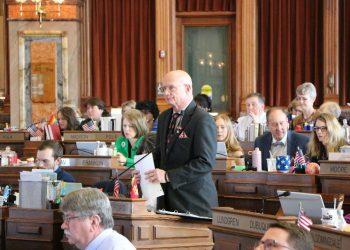(The Center Square) – Revenue estimates for the state of Iowa for fiscal year 2023 net General Fund receipts have been adjusted upward $399.6 million over March adjusted estimate.
The Revenue Estimating Conference estimates net General Fund receipts, including transfers, for the fiscal year that began July 1 is $9.53 billion, down $269.3 million from actual fiscal year 2022, the Legislative Services Agency October fiscal update said.
The REC also estimates that compared with fiscal year 2022, fiscal year 2023 will see a 4.3 percent decrease in gross personal income tax, a 3.0% increase in gross sales/use tax and a 6.8% increase in gross corporate income tax receipts. The REC estimated that in 2024, state legislators will have $60.2 million more than the revised fiscal year 2023 estimate. The panel estimates the state will receive six percent less from gross personal income taxes, 5.4 percent more from gross sales/use taxes and 2.4 percent less from gross corporate income tax.
From fiscal year 2021 to fiscal year 2022, Iowa’s gross personal income tax receipts increased 6.4 percent and its gross sales/use tax receipts increased 9.7 percent. Its gross corporate income tax receipts dropped 6.6 percent. Its total net receipts were 11.5 percent higher at the end of fiscal year 2022 compared with the end of fiscal year 2021.
“As Washington’s inflationary, tax-and-spend policies weigh down the national economy, Iowa is showing there’s a better way,” Reynolds said in a statement Oct. 13 after the meeting. “Today’s projections confirm once again that Iowa’s competitive tax code is fully compatible with sustainable revenue and a resilient budget. Going forward, we’ll continue to exercise restraint with taxpayer dollars while prioritizing high-return investments in key priorities.”
Iowa House Appropriations Committee Chairman Rep. Gary Mohr, R-Bettendorf, said the projections mean Iowa’s economy is faring well.
“Thankfully, our hard work to spend within our means, and fund Iowans’ priorities while allowing taxpayers to keep more of their hard-earned paychecks and retirement income has ensured that our economy remains strong and Iowans are better equipped to handle rampant inflation than many of our peers in other states,” Mohr said.
Iowans for Tax Relief said in a blog post Thursday that while the estimates only show modest growth in net receipts, they incorporate the phase-in of the 2022 income tax bill, which reduces revenue from Iowa’s income and inheritance taxes.
“Bottom line: These revenue estimates continue to show Iowa’s exceptional fiscal strength,” the advocacy group said. “Not only is the state well-positioned to deliver the generational tax cuts enacted by the Governor and Legislature, but Iowa is also still projected to generate upwards of two billion dollars in additional surplus revenue in FY 23 and FY24.”
Yet Senate Appropriations Committee Ranking Member Sen. Joe Bolkcom, D-Iowa City, said the REC’s estimate that state revenues are falling, paired with continued weaker job growth compared with most other states, forecasts trouble.
“Temporary federal pandemic aid propped up Iowa’s budget. Revenues will fall sharply as Iowa Republicans’ massive tax cuts for the wealthy and greedy corporations take effect,” he said. “When that happens, Senate Democrats will fight to protect property taxpayers and Iowa’s local public schools.”
The REC meets three times a year to develop revenue estimates for the current and upcoming fiscal years. Current panel members include Michael Bousselot, whom Gov. Kim Reynolds designated; Legislative Services Agency Fiscal Division Director Holly Lyons; and David Underwood, the former CFO and treasurer of Mason City’s AADG. The REC’s next meeting must take place by Dec. 15, according to state law.
















